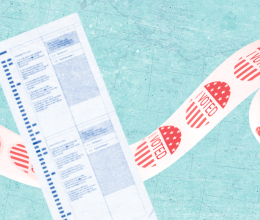COLUMBUS, OH — Today, the American Civil Liberties Union, the ACLU of Ohio, and the law firm of Covington & Burling filed a motion for summary judgment in LWV of Ohio v. LaRose, asking a federal court to strike down the restrictions in House Bill 458 that prohibit all but a small list of family members from assisting voters with disabilities in casting absentee ballots. The legal groups represent the League of Women Voters of Ohio and individual voter Jennifer Kucera.
HB 458, which became effective on April 7, 2023, makes it a felony for anyone who is not an election official or mail carrier to possess or return the absentee ballot of a voter with a disability, unless the person assisting that voter falls within a list of statutorily enumerated relatives. Many voters with disabilities who are unable to travel to their polling place are also unable to access their mailbox or a drop box, and many of these voters lack one of the “approved” relatives to mail or drop off their ballot for them. Nearly 28% of adults in Ohio have a disability.
“These arbitrary restrictions that burden the right to vote of Ohioans with disabilities are undemocratic, cruel, and in violation of several federal laws including the Voting Rights Act and the Americans with Disabilities Act. Yet the state insists, and has been fighting hard, to maintain this unlawful burden. We’re hopeful that the federal court will soon rule to remedy this disgrace,” added Freda Levenson, legal director for the ACLU of Ohio.
“Voters with disabilities face unreasonable barriers to the ballot box. Making it a felony to help your grandparent or roommate exercise their right to vote is fundamentally wrong. Ohioans with disabilities deserve to be heard, which starts by ensuring that they can freely and fairly vote,” added Jen Miller, executive director for the League of Women Voters of Ohio.
“Ohio’s absentee voting program is not designed to serve people with mobility disabilities like mine. This lawsuit is fighting back against a society that for most of history has tried to crush the voices, thoughts, and spirits of its disabled inhabitants,” Jennifer Kucera, plaintiff in the case, stated. “All I’ve ever wanted,” she explained, “is just to be given the same chances that non-disabled people are offered.”
“There is no good reason to deny Ohioans with disabilities assistance from a trusted person of their choice in exercising their right to vote. But Ohio has artificially narrowed the assistance that federal law requires to be available to voters, including by prohibiting voters with disabilities from relying on their grandchildren or their professional caregivers. We’re asking the Court to put a stop to this discriminatory practice,” said Megan Keenan, staff attorney with the ACLU’s Voting Rights Project.
The state has offered no evidence that permitting Ohio voters with disabilities to choose their assistor would fundamentally alter the absentee-voting program. A permanent injunction would prevent irreparable harm and serve the needs of the public while maintaining Ohio’s election integrity.






